Cold remedies that are natural may offer some relief
If you’re having trouble dealing with or shaking cold symptoms, you might want to give some natural remedies a try. In addition to the strategies doctors and nurses use to treat a cold, opting for natural cold remedies at the right time may offer some additional relief, too. Note that these are the options that are thought to be effective against colds. For some, there is a lack of definitive evidence in the form of randomized, placebo-controlled trials, while others have been better studied. Here are some home remedies you might consider.
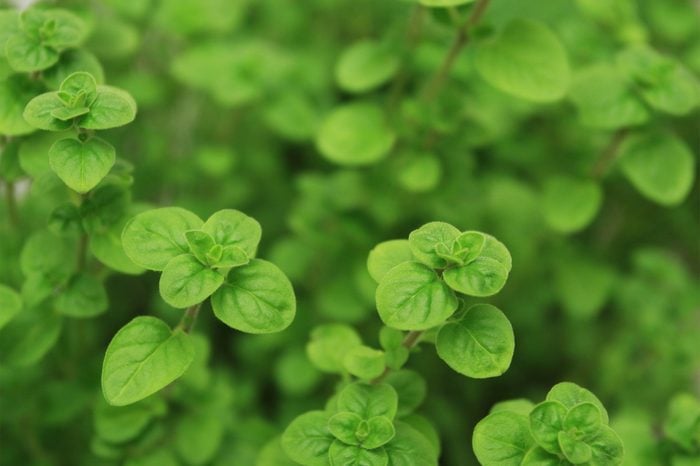
Oregano
Although oregano is best known for giving pizza and pasta an extra kick, Patrick Fratellone, MD, a leading integrative medicine doctor and registered herbalist with the American Herbal Guild, recommends reaching for this herb to treat a hacking cough. “Oregano is a powerhouse of flu-fighting properties since it’s antibacterial, antifungal, and an antioxidant, and it can also be used as an expectorant to treat lung or respiratory conditions,” says Dr. Fratellone. Surprised? You’ll never guess these crazy old-fashioned flu remedies, either.

Cinnamon
This woody aromatic herb in your culinary closet has secret powers besides flavoring oatmeal and cookies and deserves to be on your list of natural cold remedies. Because of cinnamon‘s antifungal and analgesic properties, Dr. Fratellone uses it to treat bronchitis. It tends to be warming for the body, and it dilates your blood vessels, he says. If you’re looking to fight a bug with natural cold remedies, create a cinnamon tea by pouring boiling water over the herb into a cup. Dr. Fratellone recommends one cup two or three times a day. You can also sprinkle it on your food or in your latte.
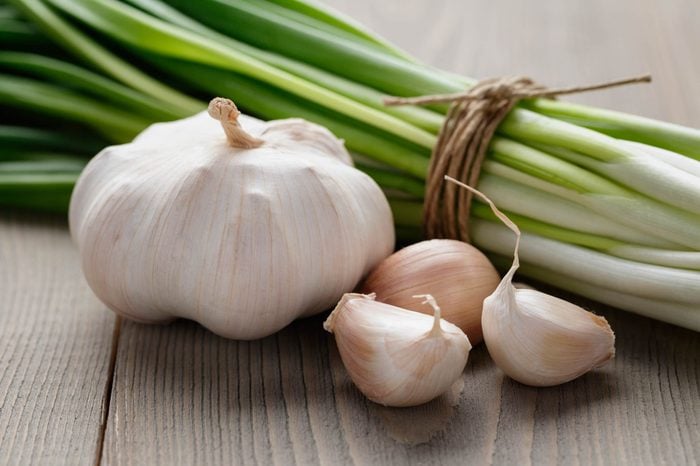
Garlic
This stinky plant does way more than flavor your tomato sauce. Garlic has antioxidant and immune-boosting properties, says Elizabeth Trattner, an acupuncture physician in Hallandale Beach, Florida. Garlic is antibacterial and may even kill antibiotic-resistant bacteria that can cause urinary tract infections (UTI). Researchers from the Birla Institute of Technology and Sciences in India conducted a study and found that garlic extract inhibited the growth of laboratory-grown antibiotic-resistant bacteria that had been isolated from patients with UTIs. (Why not mix some garlic up with one of these 14 other best foods for a cold?)
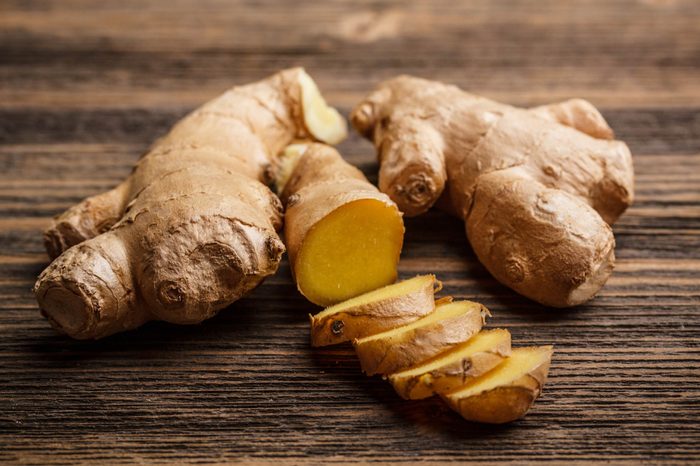
Ginger
Ginger is a Trattner’s go-to herbal medicine. Not only can it help lessen congestion, but it also’s a strong antioxidant, and has antibacterial, anti-inflammatory, antiviral powers, she says. Slice fresh ginger into silver-dollar slices and simmer it in fresh water for 20 minutes; then drink it like tea, with a spoonful of honey or squeeze of lemon if you like. Bonus: honey and lemon also have throat-soothing properties, just like these other natural cough treatments.
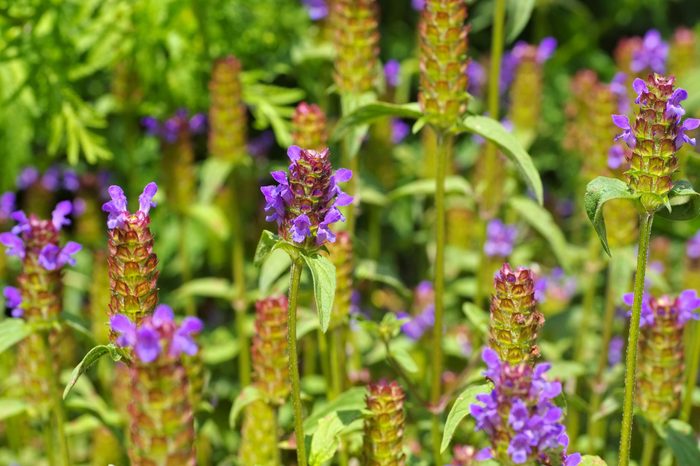
Self-heal
Self-heal is also known as Prunella vulgaris, and it’s one of Dr. Fratellone’s favorite herbs. “Also called ‘all heal,’ this herb is great for congestion, and it reduces swelling in the lymph glands,” he says. “It actually has an antibiotic effect against a wide range of bacteria and viruses,” he says. Try using it to create a tea and drinking it two or three times a day when you’re feeling under the weather.
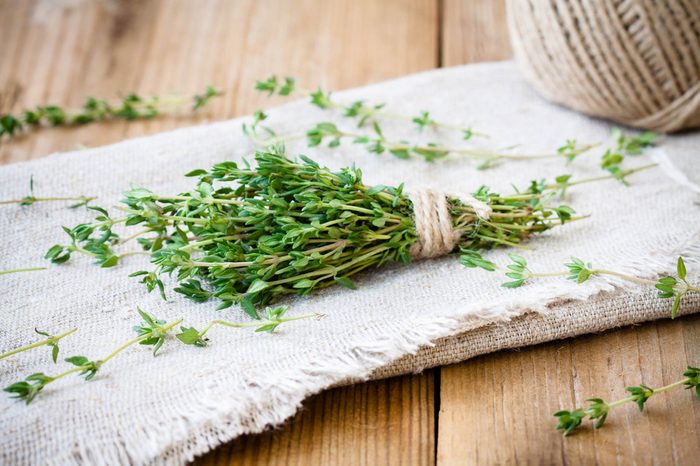
Thyme
Thyme is a lovely aromatic herb in the mint family that’s easily cultivated, and it is probably in your kitchen cabinet right now. “Thyme is a powerful antimicrobial remedy that has volatile oils, like thymol and tannins, which work for spasmodic coughs and for fighting sickness,” says Arielle Hayat, a clinical herbalist in New York City. “It’s antibacterial, antifungal, and antiviral, so it can help you sweat out a cold, and also work on supporting digestion (like other herbs in the mint family).”
Hayat likes to prepare thyme in a syrup. She melts local organic honey and infuses it with chopped onions, thyme, and/or garlic for three hours, then strains it and adds the resulting syrup to warm water or a tea as a tonic for cold, achy flu, or cough.

Elecampane
“If your cold leaves you coughing up phlegm with a dry, irritated lung and throat, elecampane, also known as Inula helenium, is the perfect remedy,” Hayat says. “It soothes irritation and relieves coughing while fighting infections with its antimicrobial properties.” The starchy root contains polysaccharides (inulin), which are useful for normalizing blood sugar metabolism and feeding the beneficial bacteria in the gut. Try taking an up to 2 ml of elecampane tincture (Hayat likes HerbPharm) three times a day, says Hayat. If your cough persists, make sure to see a doctor to rule out asthma—cough is one of the asthma symptoms no one should ignore.

Exercise
You won’t find this one in your cabinet, but regular, moderate physical activity can strengthen your immune system, boosting your ability to fight off cold and flu viruses. In one study, sedentary, overweight women who started exercising for 45 minutes five days a week were three times less likely to catch colds than women who just stretched once a week. Doctors aren’t sure exactly why or how exercise works, but some researchers theorize that physical activity boosts immunity by helping germ-fighting antibodies and white blood cells circulate better and more rapidly. Pick up a few other immune-boosting habits.

Nature
Spending time in nature leads to faster healing and a lower risk of all kinds of illnesses, including respiratory troubles, according to a 2015 review of research published in Frontiers in Psychology. During times of stress, the body shuts down “nonessential” systems like digestion and the immune system the researchers point out—but being in nature switches one’s body into a calm, “rest and digest” mode instead.
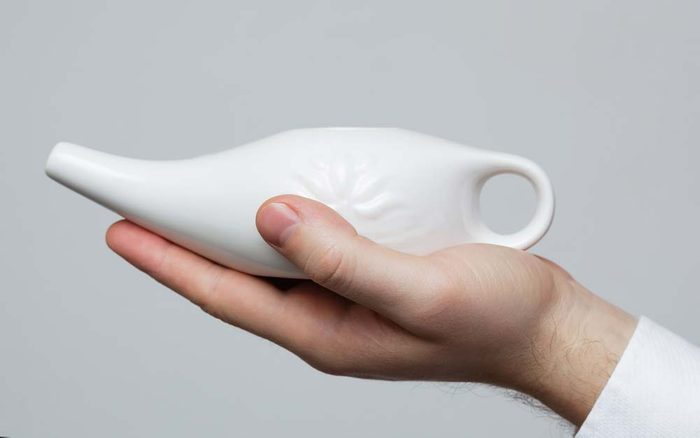
Nasal flush
Neti pots are an ancient Indian practice, and now western medical research is backing up claims that using one to pour warm saline solution into one nostril and out the other can thin mucus and clean out nasal passages, reducing sinus swelling, congestion, and nasal irritation. One 2016 British study found that people with chronic sinus trouble had a reduction in symptoms after daily use of a neti pot for allergies. It’s one of many old-time remedies that do really work. However, make sure to use one correctly. Neti pot water must be sterile to reduce the risk of rare infections. (Check out these safety tips for using neti pots.)

Lots of fluids
When it comes to advice about natural cold remedies, drinking lots of fluids is something people with a cold or the flu often hear. Here’s why: Symptoms of upper respiratory infection usually start in the nose, Evangeline Lausier, MD, an assistant clinical professor at Duke Integrative Medicine in Durham, North Carolina. “The cold virus attacks these nasal areas, and the body fights back by secreting more mucus to flush out the virus.” Drinking more fluids will keep the mucus thin and flowing so you can more easily clear it out of your system.

Chicken soup
Chicken soup is a favorite among natural cold remedies, and deservedly so: It really may be an effective weapon against colds and flu, according to an in vitro study in the medical journal Chest. The researchers found that chicken soup reduces inflammation, possibly because of the medicinal qualities of many of the traditional ingredients. Dr. Lausier agrees: “I think chicken soup is great for hydration—hot liquids, salt, and electrolytes. What goes in it can also provide healing properties: Onions and garlic can reduce the viscosity of mucus and help prevent or lessen congestion.”

Zinc
Zinc lozenges can shorten colds if you start taking them the first day you’re feeling sick, according to the National Institutes of Health. Although many nasal sprays no longer contain zinc, check the ingredients and don’t use “intranasal” zinc swabs that you put up your nose—they can cause a permanent loss of smell.

Honey
Hot lemon water and tea with honey are traditional toddies to sip when you’re sick, for good reason: Not only does steam from the warm liquids thin mucus and soothe congestion, but the honey is also an effective cough suppressant. An important study in the Archives of Pediatrics and Adolescent Medicine, researchers found that a pre-bedtime 2 teaspoons of honey relieved kids’ coughing and helped them sleep better than over-the-counter cough medicine. (Just be sure to never to give honey to a child under one year old because of the risk of botulism.)

Sleep
“One of the most important things you can do for yourself is to allow your body to rest while you are feeling under the weather,” says Ian Tong, MD, chief medical officer at Doctor on Demand. “Resting gives your body a chance to fight off the infection and can help boost your immune system.” But the opposite is also true: A study published in the Archives of Internal Medicine found that lack of sleep increases the risk of colds. Subjects who got less than seven hours of rest a night were almost three times as likely to get colds as those who got at least eight hours of shut-eye.

Echinacea
Getting a final word on echinacea is tough because studies have used so many different doses and types—tea, tinctures, capsules—over the decades. Results are decidedly mixed, but echinacea works best if taken the moment you notice symptoms, and if you continue taking it for a week to ten days, according to the Mayo Clinic. Just be sure to talk to your doctor and check for drug interactions (there are quite a few!) before taking it.
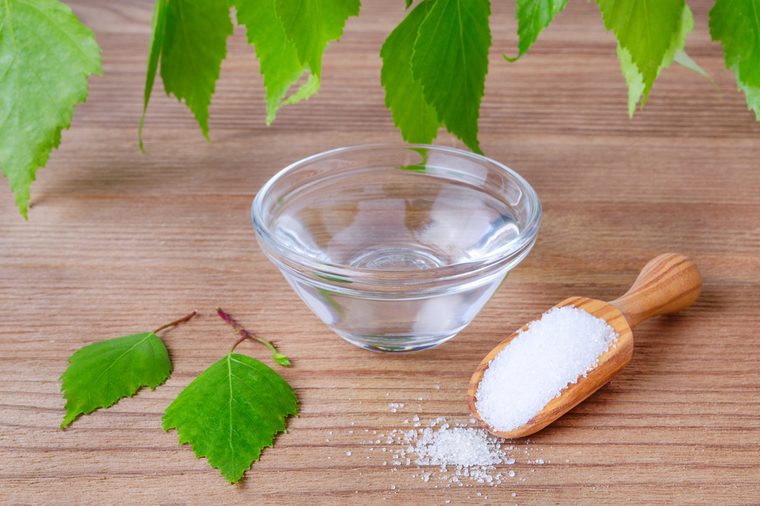
Gargling
Gargling with salt water reduces swelling in your throat when you’re sick and loosens germ-packed mucus, according to the Mayo Clinic Book of Home Remedies. But gargling daily when you’re healthy—with simple water—may help keep you from getting sick in the first place. One interesting study by Japanese researchers found that gargling reduced the risk of colds. People who gargled three times a day with plain water for two months were about 30 percent less likely than non-garglers to get colds. Of course, a cold isn’t the worst thing that can happen—don’t ignore these 12 signs a cold is something worse.

